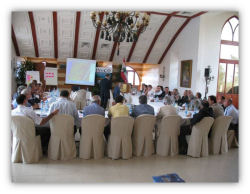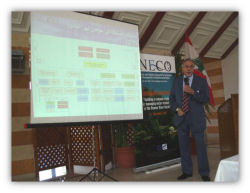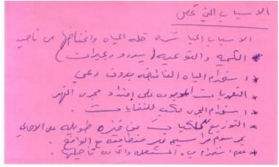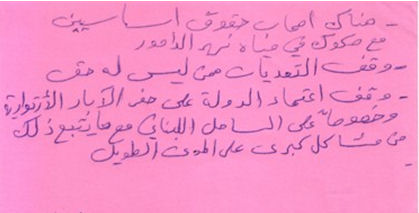|
The Lebanon workshop, titled "Building a
common vision for mitigating water stress in the Damour River Basin" was held
on Wednesday, September 12th 2007, at
the Meshref Country Club, located in the centre of the Damour River Basin, Lebanon.
The workshop, organized as a 1-day event, was attended by
43 participants, including representatives from Ministries, delegates of local
authorities, local farmers and owners of agricultural lands, representatives of
the Beirut & Mount Lebanon Water Office and NGOs, and experts working in the
field of water resource and environmental management.
The 1st session of the workshop included the
welcoming addresses of Mr. Claude Tabbal (Conseil et Developpement s.a.l., the
INECO Regional Partner in Lebanon), and of Dr. Fady Comeir (Ministry of Energy
and Water). Prof. Dionysis Assimacopoulos presented an overview of the
principles and methodological framework of INECO, focusing on the activities
foreseen in Lebanon, and the steps undertaken so far in order to establish a
constructive dialogue process at the regional level.

More information on water stress in
Damour
|
The 2nd Session of the workshop was
focused to the water stress issues faced in the Damour River Basin. Mr.
Claude Tabbal presented the problem analysis carried out so far, in
order to initiate the discussion among participants on what the real
causes of the problem are, and how these should be addressed, also
through local initiatives and efforts. The presentation was followed by
a group-work session, where all participants wrote suggestions,
perceptions and ideas on the workshop theme.

Post-it papers were placed onto the main board of the room. Participants were asked to
comment on the different suggestions, comments and ideas that had been written. A discussion was initiated in order to arrive
to a set of problems that should be further discussed during the event and in
the subsequent stages of INECO.
The 3rd session aimed at summarizing the outcomes of the
discussion, and arriving to a concrete set of follow-up actions and
recommendations for water management in the River Basin. The session was
introduced through a presentation on the IWRM principles, with emphasis on
the need for public participation, collaboration and awareness (Ms. Elina
Manoli, School of Chemical Engineering, National Technical University of
Athens). Draft policy objectives were elaborated by Mr. Claude Tabbal, to be
further discussed in subsequent meetings.
|
|
The group-work session helped identifying the different
perceptions that stakeholders had on the true causes of the problem.

Participant view over problem causes:
(1) Low water availability both in terms of quantity and quality
(2) Excessive water use, without limit and control
(3) Environmental violations all along the Damour river
(4) Disposal of solid waste into the river
(5) Illogical and irrational allocation of water among users
(6) Wastewater reuse is not practiced
|
In summary, problem causes that were identified during the
meeting were:
-
Pollution originating from communities located upstream, which affects water
quality downstream.
- Conflicts over water allocation between traditional water rights owners
and new users, combined with an outdated legislation on the regulation of
abstractions, which does not take into account the decreasing trends in river
flow and the increase in water demand.
- Inadequate governmental support for addressing the lack of water supply and
wastewater collection and treatment infrastructure in the River Basin.
- The need for an integrated water management plan, which
would also address inter-basin transfer (presently groundwater from the Damour
area is used for supplying the region of Beirut) and would promote water
conservation and use of alternative water sources (wastewater reuse).
|
|
All participants underlined the need for new
infrastructure for water supply enhancement (mostly river damming and water
recycling projects). However, other participants insisted on adopting a global
water management scheme that would address the technical, environmental and
health, financial and institutional issues at all water management levels and
operations.
Several participants stressed the need for closer
monitoring of water and environmental quality in the river basin, and that
solutions should seek after the long-term preservation of the natural capital
and heritage and the development of a "water culture" among water users.
|
It was further pointed out that due to the political
nature of water-related issues in the Basin and in Lebanon, sustainable
solutions can only be achieved through strong political commitment and
governmental support. In this regard, participants proposed that the
outcomes of the INECO Case Study in Lebanon should be formed as a
comprehensive policy proposal, which should be submitted to higher-level
policy makers for appropriate action.
More information on the workshop
|




